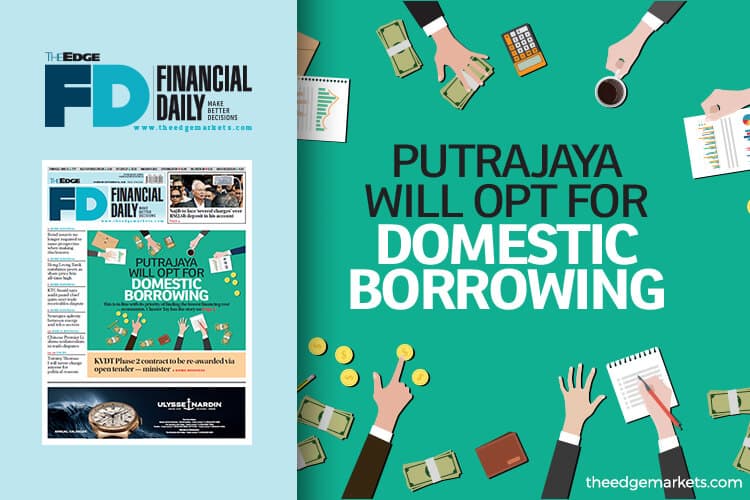
This article first appeared in The Edge Financial Daily on September 20, 2018
KUALA LUMPUR: Economists expect the government to source for money within the country after Putrajaya announced yesterday it is considering new debt issuance as an option to meet its financing needs.
Tapping local funds would fulfil the government’s priority of finding the lowest financing cost, said the economists.
Socio-Economic Research Centre executive director Lee Heng Guie said the government would likely avoid external borrowing and instead opt for measures like issuing Malaysian Government Securities, given that the interest rate for domestic borrowing is lower.
Lee was responding to Finance Minister Lim Guan Eng’s statement that Putrajaya would address its short-term financing needs through a combination of new debt issuance and asset monetisation, and ensure the move would not adversely impact growth.
“The priority is towards finding the lowest financing cost,” the minister said in his statement. “Secondly, the timing and size of fundraising will be guided by the ability of the financial markets to absorb it in an orderly manner and avoid unintended consequences. Thirdly, any form of strategy adopted will be focused on maintaining the overall confidence in fiscal sustainability and economic resiliency.”
Guan Eng assured Malaysians that the additional debt issuance will be gradual as well as transparent to the market via announcements through the auction calendar as is the practice now.
“This will ensure that investors would be able to absorb the additional issuances without major adjustments in yields that could increase the borrowing cost of the government,” he said.
Lee, speaking to The Edge Financial Daily, said the government could increase taxes to boost its revenue. “But this is not likely because they are trying not to burden the people, especially in the current economic condition,” he said.
He added that the government would have to come out with a “responsible yet disciplined” budget that can “smoothen out” the impact of expenditure rationalisation on the economy.
“It is indeed a tough balancing act. Some disposable government assets may be on the cards. We hope the minister adheres to his words of ensuring transparency in the monetisation of assets,” he said.
Lee stressed that debts and deficits are not good for the nation “as they potentially threaten our policy flexibility in the face of future downturns and distracts us from our long-term economic challenges.”
“They are also unfair to the future generations that will pay for them with lower growth, fewer jobs and higher taxes,” he added.
UOB Malaysia economist Julia Goh said debt issuance allows the government to finance expenditure at a lower cost given that the country has a good sovereign debt rating. “Malaysia is A-rated sovereign and there is ample domestic liquidity. As such it is more cost-effective as opposed to seeking foreign loans,” she said.
“The government appears to be seeking revenue enhancements and hence the talk that new taxes could be considered. Whether new taxes are necessary depends on how well the government is able to adjust spending,” she said.
Goh said if Putrajaya’s spending cuts can successfully trim wastage and unproductive expenditure without sacrificing growth, new taxes may not be necessary. “However, Malaysia’s government revenue is skewed towards direct taxes [over 50% of total revenue]. As such this makes it more challenging for Malaysia to lower income tax rates to improve the country’s competitiveness,” she said.
“Therefore tax reforms to broaden the revenue base is encouraged. It will also help to reduce the pro-cyclicality of the tax base [meaning when economy contracts, tax revenue also declines],” she added in an email reply.
MIDF Amanah Investment Bank chief economist Dr Kamaruddin Mohd Nor agreed new debt issuance from the government is not going to adversely affect the country’s sovereign rating.
“Debt issuance is a common method for the government to address its fiscal needs. Judging by our current fiscal standing as well as current macroeconomic condition, debt issuance will not adversely affect our sovereign rating,” he said.
“The government is still having a favourable debt composition with 97% denominated in ringgit with minimal foreign currency risk exposure,” he added.
In his statement yesterday, the finance minister said the benefits of sovereign debt issuance are plenty.
“This method is the simplest, most reliable, and easiest to manage due to the size of our institutional investors. Rest assured that the additional debt issuance will be gradual as well as transparent to the market via announcements through the auction calendar as per current practice,” he said.
In terms of monetising “non-critical and non-strategic” government assets, Guan Eng said the new administration will “ensure that this will be deployed in compliance with the highest standard of governance and transparency without disruption to the business community and the people”.